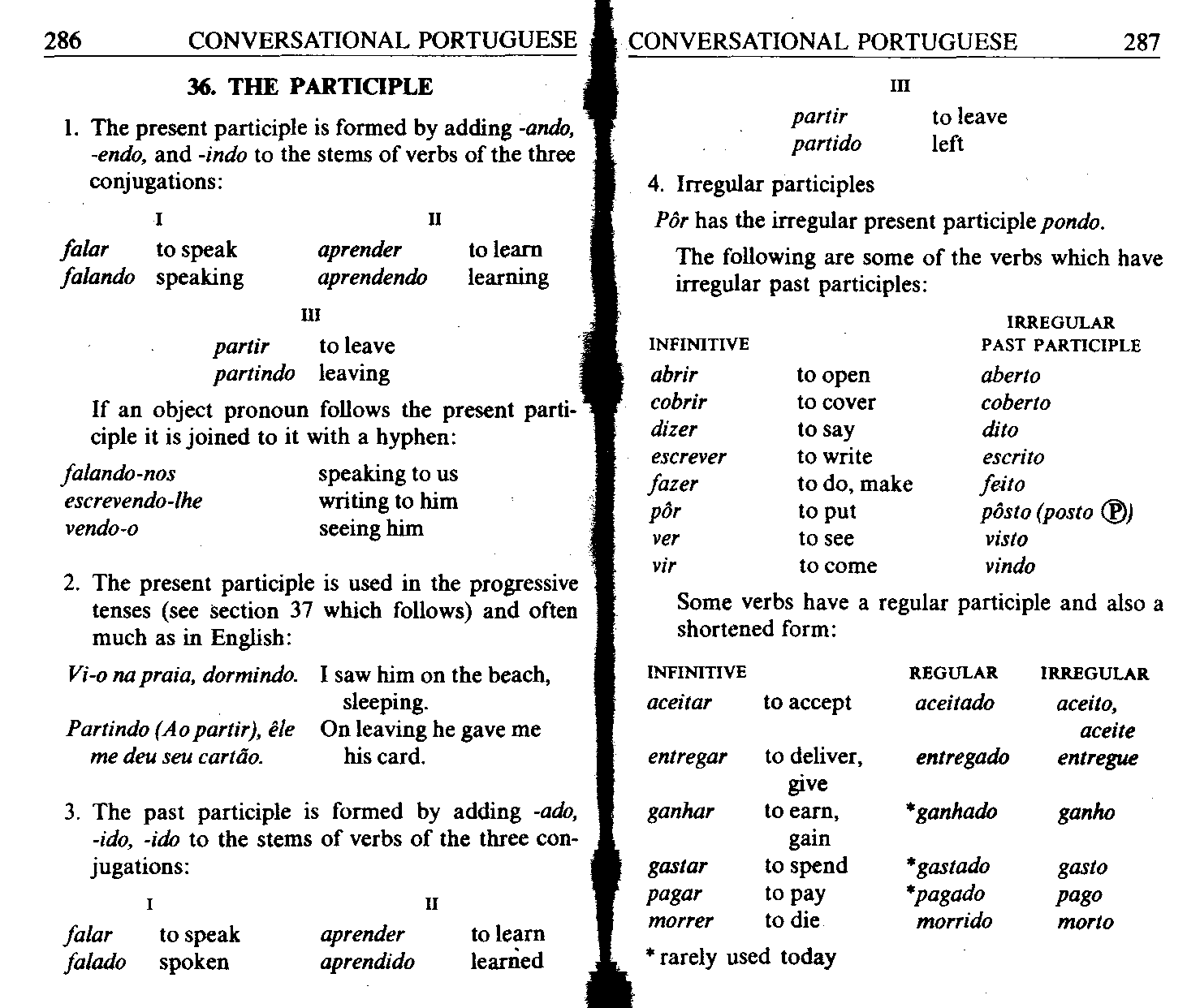Summary p286

to łeara learning

ii
aprender
aprendendo
falando-nos
escrevendo-the
vendo-o
286 CONYERSATIONAL PORTUGUESE
36. THE PARTICIPLE
1. The present participle is formed by adding -ando, -endo, and -indo to the stems of verbs of the three conjugations:
i
falar to speak falando speaking
Ul
par tir to leave
partindo łeaving
If an object pronoun follows the present participle it is joined to it with a hyphen:
speaking to us writing to him seeing him
2. The present participle is used in the progressive tenses (see section 37 which follows) and often much as in English:
Vi-o na praia, dormindo. I saw him on the beach,
sleeping.
Partindo (A o partir), ele On leaving he gave me me deu seu cartao. his card.
3. The past participle is formed by adding -ado, -ido, -ido to the stems of verbs of the three conjugations:
i ii
falar to speak aprender to learn
falado spoken aprendido leamed
CONYERSATIONAL PORTUGUESE_287
m
partir to Ieave
partido left
4. Irregular participles Pór has the irregular present participle pondo.
The following are some of the verbs which have irregular past participles:
IRREGULAR
|
INFINITIYE |
PAST PARTICIPLE | |
|
abrir |
to open |
aberto |
|
cobrir |
to cover |
coberio |
|
dizer |
to say |
dito |
|
escrever |
to write |
escrito |
|
fazer |
to do, make |
feito |
|
pór |
to put |
pósto (posto |
|
ver |
to see |
visto |
|
vir |
to come |
vindo |
Some verbs have a regular participle and also a shortened form:
|
REGULAR |
IRREGULAR |
|
aceitado |
aceito, aceite |
|
entregado |
entregue |
|
*ganhado |
ganho |
|
*gastado |
gasto |
|
*pagado |
pago |
|
morrido |
morto |

|
INFINITIVE aceitar |
to accept |
|
entregar |
to deliver, |
|
ganhar |
give to earn, |
|
gastar |
gain to spend |
|
pagar |
to pay |
|
morrer |
to die |
* rarely used today
Wyszukiwarka
Podobne podstrony:
Summary p296 296 CONYERSATIONAL PORTUGUESE faldramos aprenderamos partiramos (fałdreis) (aprend
Image0106 rjwfc I to W ) ilu ’/tommw% II «I«H V - *1«M F/ ( fr/ <1 *1 I) Cf r/»<i r) $2
SL371877 i V I ! to rv, I C4 to ■»i l l TTTTT I . i I I <V, ( ii V ri X Vf Ą
koliber II (9) SMsassssB «Cclsffifes Please refer to this color list for each afghan square. (Since
pg017 Bod** błock* to want ovw* • • ii! 8
ScannedImage 3. Azja Mniejsza w I tysiącleciu p.HETYCI I HURYCI Hetyci to lud zamieszkujący w II tys
koliber II (11) torllst Please refer to this color list for each afghan square. (Since the afghan is
i , • ] to &%/ i? V .-.Jg *ru ^f; S ii %»ą L«Mk9 m
“ r , 1 * TO- łiiSJ. -JJ II IXX 1 __—?—rTffiggr , i i IjJ
NO TO-DO DO II klf[ft hep "‘ WEEK P RTNO g(/u ypp? ! ,.£S UINTER TUE SUrWER Y
Learning in this course You are expected to attend aH lectures, tutorials, and labs in order to maxi
IMAG0422 (3) to . ll®4- j i■■■-;-!■ f f
więcej podobnych podstron